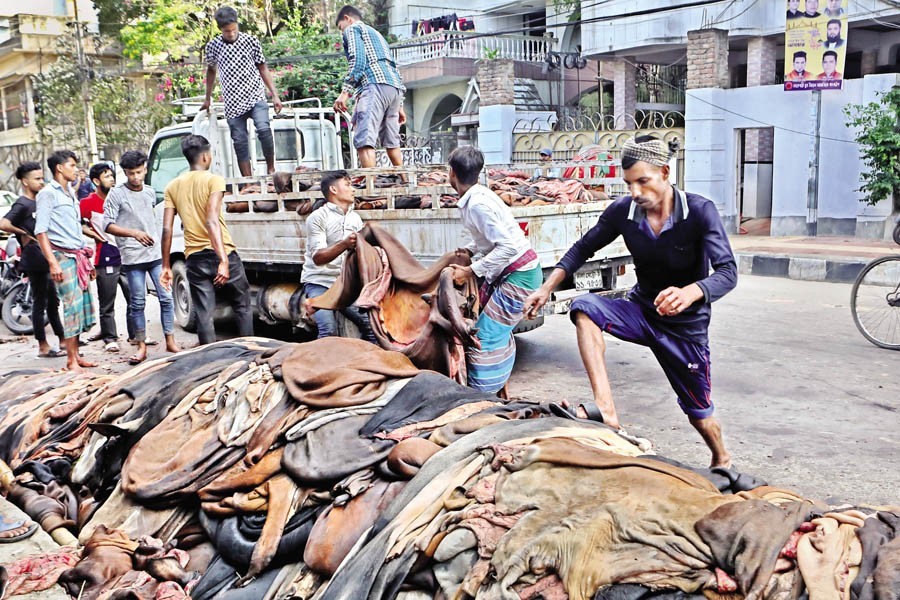The tanners have collected rawhides of sacrificial animals this year at better prices than that of the last year, when people had to throw away the valuable raw material for the leather industry, insiders said.
They reported no major incidents of dumping rawhides into rivers, roads and elsewhere across the country this year as witnessed last year amid poor price offers.
They highlighted two major factors that have helped revive the market during the biggest domestic rawhide-sourcing season for the tanners and leather goods manufacturers.
The tanners directly purchased the raw material from the collectors without middlemen while the seasonal traders remained active unlike previous years due to incurring financial losses over the last few years, the industry insiders said.
Talking to the FE, general secretary of Bangladesh Tanners Association (BTA) Md. Sakawat Ullah said the market was pretty good this time as the sellers bagged good prices while the preservation facilities for the collected rawhides were good this year.
"That's why we have not seen any incident of dumping or damaging rawhides," he added.
When asked what factors contributed largely to the calm situation this year, he said the tanners directly purchased the rawhides of the sacrificial animals.
"It is encouraging to see the collectors selling the rawhides to the tanners directly to get a good price as they did not depend on the middlemen," he said.
Giving an example of the price trend, Mr. Ullah, also managing director of Salma Tannery Ltd., said that a large piece of rawhide of cow or buffalo was being sold between Tk 700 and Tk 1000 while a medium one ranged from Tk 600 to Tk 700 a piece.
"Last year, the prices were Tk 600-700 and Tk 400-500 for large and medium ones respectively," he said.
He also pointed out that the gathering in Posta, a rawhide hub in Dhaka, was much fewer than the previous occasions.
According to the BTA, its members planned to source around 10 million pieces of rawhide this season. Until Tuesday afternoon, some 360,000 pieces have already been procured locally.
The situation in old Dhaka's Posta was found quite unusual with collecting a much lower volume of rawhides this year.
Traders blamed unplanned and unauthorised trade of rawhides in different parts of the country, especially in the surrounding areas of Savar tannery estate.
"I think the number of rawhides brought here in the first three days of Eid-ul-Azha would hardly cross 0.1 million, which is nearly half of the previous years," said Nure Alam, proprietor of an aaroth (wholesale trading house).
Posta is gradually losing its ground as new trade centres are being established near the Savar tannery estate and elsewhere across the country, said Mr Alam, adding that the tanners were also buying the rawhides directly from the seasonal rawhide traders this year.
During a visit there on Tuesday, Posta was found to be having comparatively lower business activities.
The traders bring the rawhides to the Posta aaroths where they are preserved with salt and other elements for 10 to 12 days before sending to the tanners.
Md Shah Jahan, an aaroth owner, said they were buying rawhides at higher prices compared to last year.
"We are offering Tk 1,100 to Tk 1,200 for a large piece of rawhide of cow which is on average Tk 300 higher than that of the last year," he said.
He also said that they usually buy around 5,000 pieces of rawhide every year and expected to collect the same quantity this season too.
This year, the price of salted cow rawhide is fixed at Tk 47-52 per sq ft in Dhaka and Tk 40-44 outside Dhaka. Besides, the price of goat hides has been set at Tk 18-20 per sq ft while it is Tk 12-14 per sq ft for female goat hides across the country.
Last year, the price of salted cow rawhide was fixed at Tk 40-45 per square foot in Dhaka and Tk 33-37 per square foot outside of the capital. The price of goat hides was set at Tk 15-17 per square foot.
[email protected] and [email protected]


